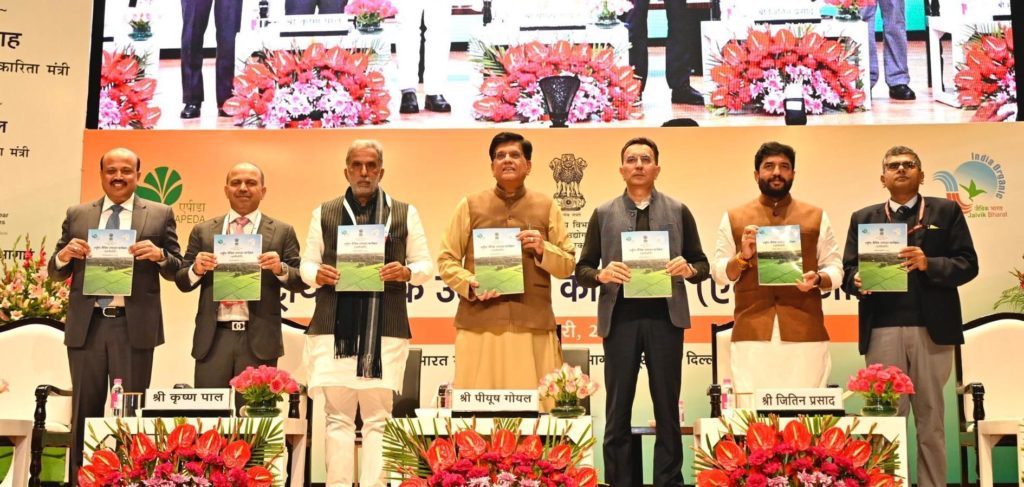Union Minister of Commerce & Industry Piyush Goyal has envisioned a remarkable future for India’s organic farming sector, setting a target of Rs 20,000 crore in organic exports within the next three years.
Speaking at the launch of the 8th edition of the National Programme for Organic Production (NPOP) at Pusa, New Delhi, Goyal emphasized the critical role of cooperatives in propelling India’s organic farming agenda and sustainable agricultural growth.
Besides Piyush Goyal, those present included Jitin Prasada, MoS for Cooperation, Murlidhar Mohol, MoS for Cooperation, Krishan Pal Gurjar, Secretary, Ministry of Cooperation, Dr. Ashish Kumar Bhutani and senior government officials.
Goyal highlighted how cooperatives and Farmer Producer Organizations (FPOs) are transforming India’s organic farming landscape. Institutions like Amul, NAFED, and the National Co-operative Organics Limited (NCOL) have played pivotal roles in fostering the organic movement. These cooperatives provide a collective platform for small and marginal farmers, enabling them to scale production, access global markets, and secure fair pricing for their produce.
The event, which saw participation from key government officials and stakeholders, was marked by the unveiling of multiple initiatives, including the NPOP portal, Organic Promotion Portal, and the upgraded TraceNet 2.0 system. These digital tools aim to enhance transparency, traceability, and ease of operations for organic farmers, cooperatives, and exporters, streamlining the journey from farm to global markets.
Goyal also acknowledged the contributions of Union Minister of Home Affairs and Cooperation Amit Shah in streamlining cooperative operations and reducing application costs through initiatives like TraceNet 2.0. By leveraging the strength of community farming through cooperatives, India is witnessing a surge in the number of organic farmers and their integration into global value chains.
The newly launched Organic Promotion Portal allows farmers, cooperatives, and FPOs to showcase certified organic products and connect with global buyers. It also offers capacity-building sessions and information on organic trade events. These efforts aim to strengthen the organic value chain, from production to packaging and marketing, ensuring farmers receive fair prices while enhancing product quality and international competitiveness.
Goyal praised the collaborative efforts of cooperatives, government agencies, and industry players in advancing India’s organic sector. With support from APEDA and international partners, India is poised to become a global leader in organic exports. The revamped AgriXchange and APEDA portals further empower stakeholders with data-driven insights and seamless connectivity to international buyers.
The 8th NPOP edition introduces robust amendments to enhance credibility, including IT-integrated oversight mechanisms and public disclosure of organic certifications. These measures are set to empower India’s organic farming community while ensuring global compliance and quality assurance.
With the cooperative sector at the helm, India’s organic revolution is not just about sustainable farming but also about community-driven economic empowerment, environmental stewardship, and global leadership.
